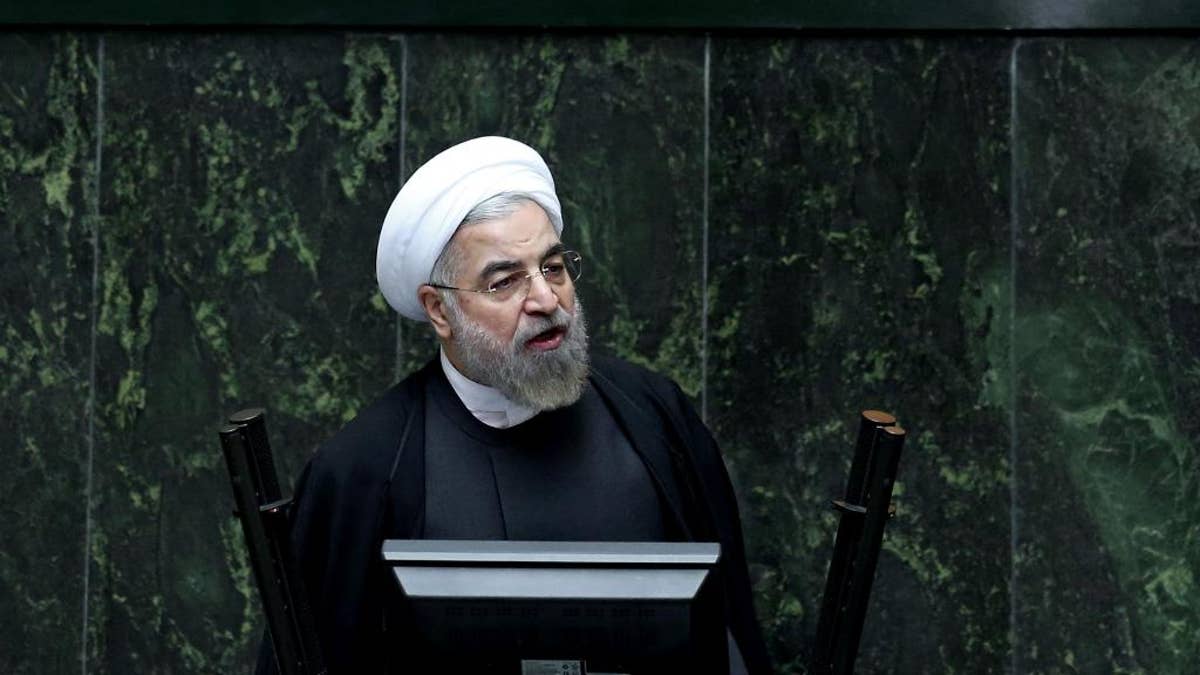
FILE - In this file photo taken Wednesday, Oct. 29, 2014, Iranian President Hassan Rouhani speaks during a debate on a vote of confidence for his choice for the new minister of Science, Research and Technology, Mahmoud Nili Ahmadabadi, in an open session of parliament in Tehran, Iran. The political stakes are high for Rouhani as nuclear negotiations with the West enter the homestretch toward a June deadline. Reaching a deal would bring him a victory, help repair the economy and boost moderates seeking greater social freedoms. Failure will strengthen hard-liners who opposed the talks from the start. (AP Photo/Ebrahim Noroozi, File) ((AP Photo/Ebrahim Noroozi))
PARIS – A year ago on January 27, 2015, French President François Hollande came to Auschwitz to commemorate the 70th anniversary of the camp’s liberation. This was just three weeks after Jews had been murdered at the Hypercacher kosher market attack in Paris, providing him an opportunity—in the presence of government colleagues and foreign dignitaries—to denounce anti-Semitism and reiterate his determination to fight it.
Hollande was surely sincere in what he said. But this year he will not be going to Auschwitz for the anniversary.
Instead, he will be at the Elysee Palace to welcome the Iranian president.
That’s right, Iranian president Hassan Rouhani.
Rouhani, very tactfully, cancelled his scheduled trip to France after the November 13 terror attacks in Paris. He changed the date of his visit to the City of Light to January 27-28.
We already knew that the Iranians are clever, shrewd analysts of world events, skillful diplomats. But until now we didn’t appreciate their dark sense of humor.
The January 27th is not just the date that Auschwitz was liberated. It is also the day that France, along with the rest of the world, thanks to a U.N. resolution, marks International Holocaust Remembrance Day, dedicated to recalling the victims of the Nazi genocide and preventing similar crimes against humanity.
As President Rouhani prepares for his morbidly-timed visit to Paris, it is important to recall the words of his predecessor, Mahmoud Ahmadinejad, who repeatedly declared the Holocaust “a myth” and said that the State of Israel should be “wiped off the map” -- remarks that the current Iranian president has never contradicted.
Indeed, adding an extra layer of tragic absurdity, Iran is currently running its annual Holocaust cartoon contest, a response to the caricatures of Muhammad published by Charlie Hebdo (which cost the artists their lives). The theme of the contest is: “Did the Holocaust really happen?” Since the Iranian leadership think it is acceptable to laugh at anything except the Prophet anti-Semitic “jokers” of all stripes—the extreme right, the extreme left, Islamists, and assorted others—will have the opportunity to let loose on the gas chambers.
What is the point of visiting Auschwitz-Birkenau if recalling the crimes of the past does not lead to addressing the threats of present and the future? What have we learned from history if this January 27, just over two weeks after the commemorations of last year’s deadly attacks in Paris, the highest authorities of the French government welcome the anti-Semitic Iranian president?
Perhaps President Rouhani wants to show the world that Iran has changed. We therefore propose that President Hollande invite his guest to join him in a visit to the Shoah (Holocaust) Memorial in Paris. The head of the Islamic Republic of Iran could read there the endless list of names of the deported, those who were shot, gassed, denied all humanity and dignity, and those who, in Primo Levi’s words, are killed a second time by "denying the horrors they suffered.”
That would give Rouhani the chance not only to commemorate the victims, but also to imagine a world of tomorrow where religious and sexual minorities are not persecuted, where women are free, where terrorist organizations are not supported and financed, and where the legitimacy of other states is not questioned.
It is doubtful that President Rouhani would be interested in making such a visit. But the very offer would mark a deeply meaningful gesture from the French president, making clear that France remembers, and has every intention of fighting those who threaten liberty, human rights, peace, and fellowship.
